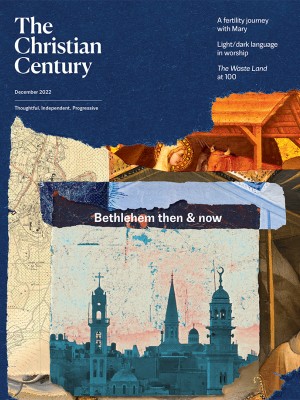December 11, Advent 3A (Matthew 11:2-11)
John the Baptist is not sure if Jesus is very Christlike.
From his clothing and eating practices to his intense personality and wilderness lifestyle, we know John the Baptist for being eccentric. As far as we can tell from scripture, this is not a pointless performance. Rather, it is all part of being disciplined in his sense of purpose and identification with Elijah.
In many ways, he is wearing his vocation on his sleeve. Before he even opens his mouth, those around him know that John is dedicated to being a prophetic voice for the people of God. Such a voice has been missing for hundreds of years. By the time of John and Jesus, there is a great deal of confusion about the role of the chosen-yet-conquered people of God. John gains the trust of many, and he reinvigorates an identity and focus for them.
Read our latest issue or browse back issues.
While his main task is to point people to Jesus, he generates certain expectations of what Jesus will accomplish and how. John even has a group of disciples who are ready to move in support of Jesus’ upcoming cosmic display of authority. The problem is that Jesus is taking too long. John has a lot riding on being right about Jesus, but now he is wondering if he was wrong.
John sends his disciples to ask Jesus, “Are you the one who is to come, or should we look for another?” (CEB). While we don’t have details of any prison-visit conversations with the disciples, we do know that it’s what John heard “about the things the Christ was doing” that leads to his question. Previously, John claimed that the ax was at the root of trees that bore no good fruit (3:10), but Jesus seems to lack the ability to swing. Rather than raising a powerful winnowing fork and throwing chaff into fire (3:12), Jesus’ actions identify him more and more with people who hold zero social power. Healing and forgiving are important and generate a significant following, but John expects the Christ to be doing much more.
As strange as this may sound, John is not sure Jesus is acting in a Christlike manner. What does it mean to be Christlike? We often use this term to refer to the daily grace-filled interactions of Jesus and how we can reflect them in our own lives and situations. We are not thinking about the equivalence of Christ with Messiah. We would certainly raise an eyebrow if we heard a fellow Christian say, “I want to learn how to respond in a Messiah-like manner to a complicated situation at work.” However, John isn’t separating Christlike from Messiah-like. John may have expected Jesus to welcome the excluded, but he did not expect the Messiah himself to become marginalized.
It is possible John also received reports that Jesus doesn’t fast as often as John’s disciples (9:14) and heard accusations of Jesus being “a glutton and a drunk, a friend of tax collectors and sinners” (11:19). But even these claims are tied to who Jesus is forgiving, healing, and welcoming. As a practical theologian, I have to say that I appreciate how John’s theological question derives from his concerns about what is happening in daily life. He even engages practical theology’s constructive work of prayerfully placing his empirical findings in dialogue with Christian sources. Of course, John takes his inquiry to the best source possible—Jesus.
Indeed, the passage’s profundity shows up in Jesus’ response to the question. Jesus doesn’t highlight actions that John and his disciples have failed to notice. Rather, he highlights the very deeds that led to John’s question in the first place! But he also brings the language of Isaiah into the conversation to give John’s disciples a helpful interpretive lens for what they are seeing and hearing. John’s disciples can now recognize that the very practices and friendships that led them to question Jesus’s Christlikeness actually reveal that Jesus truly is the Christ.
Does this mean John is in the wrong role and wearing the wrong clothes? Does it mean he has not been pointing to Jesus? No. After John’s disciples leave, Jesus could denounce John for his question. Instead, he affirms that John is a true prophet, identifies him with Elijah, and says no one has been greater in preparing people for the kingdom. In this passage, we find that even a prophet committed to holiness who Jesus calls one of the greatest remains a work in progress. Jesus makes room for John to doubt and to grow in faith, understanding, and calling. This is good news for us.





